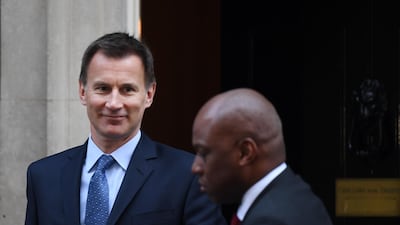A leading British lawmaker has warned that the Yemen conflict is being used by Iran to test advanced missile developments that have violated United Nations resolutions on Tehran's ballistic weapons programme.
Graham Jones, a Labour MP who chairs parliament's committee to scrutinise global military sales, asked if officials shared his concern that "Iran is using Yemen as a testing ground for its missile programme".
"We've seen the UN panel of experts talk about the new Kamikaze drones that are coming out of Iran, we've had the Badr-1, which is the missile system that looks like a V2, being launched into Saudi Arabia and we have seen from technical reports that the enhancements that are being applied to that war by Iran are considerable," he said.
Iran's ballistic missiles represents a threat to the region despite the signing of the 2015 nuclear deal, according to the Foreign Office's Middle East minister Alistair Burt. "Alongside our partners we continue to call on Iran to act consistently with all UN security council resolutions in relation to ballistic missile programme," he said. "It is essential to get the conflict in Yemen to an end, to prevent that sort of threat, to prevent it being used as a based for the testing of weapons."
Mr Burt added that while London continued to believe that Iran was complying with the restrictions on its nuclear programme set out in the 2015 nuclear deal, it needed to be clear about that the issues around weaponry was equally critical.
Jeremy Hunt, the British foreign secretary, announced that he would visit Saudi Arabia, Oman and UAE within days in order to promote diplomatic efforts centred on the peace efforts of the UN envoy, Martin Griffith.'
He told parliament that he hoped the upcoming trip would add further impetus to the Stockholm process and build on the agreement, which he described as the first prospect of peace in four years.
"This may be one of the last opportunities to prevent a return to fighting and secure desperately needed humanitarian aid," he said.
One other item on the agenda is likely to be military equipment exports to Saudi Arabia. Mr Hunt is involved talks with the Germany and France over Berlin's continuing restrictions on arms exports. He used a letter leaked last week week to stress that strict rules on arms exports, including the role of Mr Jones committee, was built on independent assessments of exports and assesses the risks of breaches of international humanitarian law.
"The strategic relationship that the UK has with Saudi Arabia is what allows us to have a huge influence in bringing about peace in Yemen," he said. "We need to be able to continue that strategic relationship in order to make sure that there is a European voice at the table doing everything we can to press for peace."


